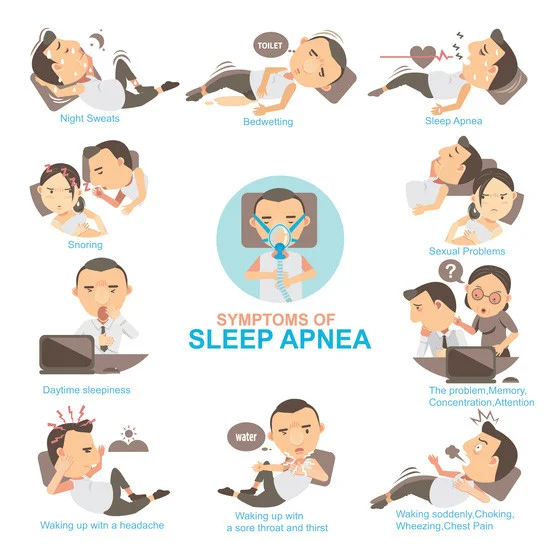SNORING & SLEEP APNEA
WHAT IS SNORING?
Snoring is the vibration of respiratory structures and the resulting sound is due to obstructed air movement during breathing while sleeping. In some cases, the sound may be soft, but in most cases, it can be loud and unpleasant. Snoring during sleep may be a sign, or first alarm, of obstructive sleep apnea (OSA).
It’s defined as “Noisy Sleep”
Snoring occurs when the throat structures, especially the tongue are abnormally large and/or when (during sleep) the tongue relaxes, falls back and causes a partial obstruction of the flow of air. As the lungs try to push air past these obstructions, the structures vibrate as the air rushes past, and causing the sound we know as snoring. While snoring may be harmless (benign snoring), it can also be a sign of a more serious medical condition that progresses from upper airway resistance syndrome (UARS) to obstructive sleep apnea (OSA).
Snoring interrupts that restful, quiet sleep which is so important to optimal health. Usually people do not hear themselves snore, but snoring can cause disrupted sleep for both the snorer and sleeping partner. It can lead to daytime sleepiness and fatigue, which can affect the ability to function effectively at home and at work, and may lead to cronic health problems. It is important to eliminate snoring so everyone can get a restful night’s sleep and maintain good health. It is equally important to have a simple sleep study done to determine whether it is just benign snoring or a far more concerning condition such as obstructive sleep apnea.
If you snore you are not alone. Statistics indicate that approximately 40% of adults over the age of 40 snore some or all the time. And the number continues to grow…
WHAT IS SLEEP APNEA? IT’S A BIG TONGUE IN A SMALL MOUTH.
Sleep Apnea is the complete obstruction of the airway where the airway remains blocked for a minimum of ten seconds. It can be as much as 70, 80 or 90 seconds or more. But when it stays blocked even once for at least 10 seconds, it is called a Sleep apneic event. A partial blockage is snoring and a complete blockage is Sleep Apnea.

Here’s a simple visual: take your foot, whatever size, and try to put it in a shoe that is three sizes too small for you. What happens? It’s only going to go in so far. Where’s the rest of the foot going to go? Well, simply, the rest of the foot is going to hang out of the back of the shoe. The same thing happens if you have a big tongue in a small mouth. Your teeth are in the front and on the sides. The only place there is room for your tongue to go is the back of the throat.
Let’s look at this at its most basic and logical level. There is no rocket science involved here. Many articles you may have read regarding Sleep Apnea, or when you speak with many doctors about Sleep Apnea, they say that Sleep Apnea is about the airway collapsing. It is not necessarily the airway collapsing as much as it is about the airway becoming blocked.
When a snoring person rolls over (after being elbowed by their spouse), their tongue moves and no longer blocks the throat. But, if it was only about the airway collapsing, you could be on your left or right side or your front or your back when you are sleeping, and it wouldn’t make a difference. You would still have the same closure of the airway: snoring and sleep Apnea would still occur. But we know that’s not the case. When you roll on your side your tongue no longer blocks the air passage and you no longer snore.
For the thousands of sleep studies that we have reviewed, almost every sleep study shows that the Sleep Apnea is worse when the patient is sleeping on their back.
If you look anatomically at what is going on, the only thing that would make the Sleep Apnea worse when you are on your back is the tongue falling back due to gravity. And that is a very very big issue. When we look at it logically, we find that the tongue falls back due to gravity and closes the airway. Now, a partial obstruction of the airway is what we call snoring. Snoring makes the noise it does because as the airway becomes blocked, or the diameter of the airway shrinks from the tongue falling back closing the airway.
BED PARTNERS

Is your partner is driving you CRAZY every night? Snoring and sleep apnea don’t just affect them, they affect you as well. Did you know that the bed partners of people who snore lose an average of one hour of sleep every night? Over half of the patients that call our office are calling regarding someone else.
Give us a call today to schedule a complimentary consultation for your snorer and get the help YOU need.
